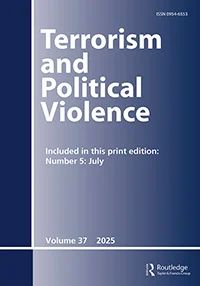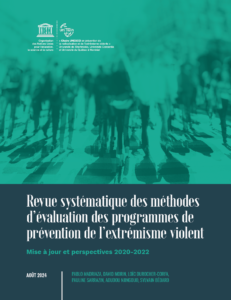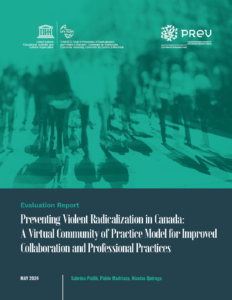THE CHAIR'S LITERATURE
Find here a list of all the scientific papers published by the UNESCO Chair in Prevention of Violent Radicalization and Extremism. They are authored by various experts and research professionals involved with our organization.
Publication in the Terrorism and Political Violence journal
- September 15, 2025
- Sylvana
- Literature Chair, News, Spotlight

Pablo Madriaza, associate professor of the UNESCO-PREV Chair, along with David Morin and Ghayda Hassan, co-holders of the Chair, have published a new article entitled “How Rigorous are Evaluations of Violent Extremism Prevention Programs? Results from a Systematic Methodological Review” in the journal Terrorism and Political Violence. This study systematically reviews the quality of 267 evaluations published in English, French, and Spanish up to December 2022, addressing concerns over bias and limited empirical evidence. Using the Mixed Methods Appraisal Tool (MMAT), diverse study designs were examined —including qualitative, quantitative descriptive, nonrandomized, randomized controlled trials, and mixed methods—to assess rigor and
Report “LES ENFANTS : DES LEADERS POUVANT CONTRIBUER À UNE SOCIÉTÉ MIEUX INFORMÉE ET PLUS CRITIQUE FACE À LA DÉSINFORMATION ?”
- April 10, 2025
- Sylvana
- Literature Chair, News, Spotlight

CHILDREN: LEADERS WHO CAN CONTRIBUTE TO A BETTER-INFORMED, MORE CRITICAL SOCIETY IN THE FACE OF MISINFORMATION? Fighting misinformation, amplified by digital technology and artificial intelligence, requires the development of appropriate tools and programs. That’s why the UNESCO-PREV Chair’s media unit has been examining the role of the Les As de l’info platform in this project. This platform, created in 2022 and managed by the Les Coops de l’information group, is a particularly interesting youth medium. The general objective of this study is to understand the uses made of the platform by young French-speaking Canadians aged 8 to 12, and the
Report Désinformation et déni climatique : revue de la littérature et portrait de la situation au Québec
- March 20, 2025
- Sylvana
- Literature Chair, News, Spotlight

The UNESCO-PREV Chair is proud to present this new report, which takes an overview of climate misinformation, disinformation and denial in Quebec and Canada. The report firstly summarizes what we know about the manifestations of climate denial, its causes, how it relates to misinformation and disinformation, and the solutions being considered to counter it. Secondly, it provides an analysis of media coverage of climate misinformation, highlighting the issues involved in transmitting information between the scientific community, the general public and other interested parties, who meet at the crossroads of the media. Thirdly and finally, this report offers a typology of
Revue systématique des méthodes d’évaluation des programmes de prévention de l’extrémisme violent-Mise à jour et perspectives 2020-2022
- November 26, 2024
- Sylvana
- Literature Chair, News, Spotlight

A new update of the systematic review of programs to prevent violent extremism, carried out as part of the PREV-IMPACT project, now covers the years 2020, 2021 and 2022. It aims to identify studies published in English, French or Spanish, to assess the methodological quality of the programs, and to enrich the repertoire available online, while deepening the analysis of the evaluation models and indicators used. To consult this new publication (only available in french), click here..
Report “Preventing Violent Radicalization in Canada: A Virtual Community of Practice Model for Improved Collaboration and Professional Practices”
- May 09, 2024
- Sylvana
- Literature Chair

As part of the PREV-IMPACT Canada project, the UNESCO-PREV Chair carried out an evaluation of the project “Preventing Violent Radicalization in Canada: A Virtual Community of Practice Model for Improved Collaboration and Professional Practices”, led by CPN-PREV. This initiative aims to create a virtual community of practice where participants (practitioners and managers in the field of preventing violent radicalization and extremism across Canada) meet regularly to share knowledge, discuss their respective cases and foster collaboration. Written by Sabrina Paillé, Pablo Madriaza and Nicolas Quiroga, this evaluation is based on a theory of change and uses a longitudinal and mixed-methods approach
Publication of the “Insights into Covid-19 Related News Media Discourse and Public Health Authorities’ Digital Communication”
- April 24, 2024
- Sylvana
- Literature Chair, News, Spotlight

Marie-Eve Carignan, co-holder of the UNESCO-PREV Chair, and Olivier Champagne-Poirier, associate professor of the UNESCO-PREV Chair, have published a report on strategic communications during COVID-19. In this report, produced for the NATO Strategic Communications Centre of Excellence, media coverage of the pandemic and communication on the Facebook pages of public health agencies in Belgium, the UK and the USA were analyzed. To read the report, click here.
